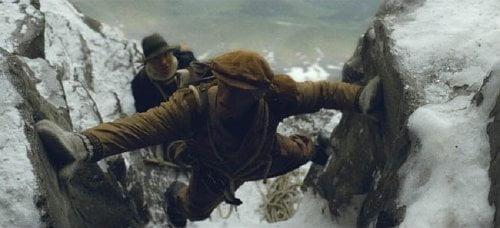North Face (Nordwand)

In 1936 as Nazi propagandists celebrated the athletic Teuton and the mountain films of Leni Reifenstahl, Toni Kurz (Benno Fürmann, "The Princess & the Warrior," "Speed Racer") and Andreas Hinterstoisser (Florian Lukas, "Good Bye Lenin!") had the attention of National Socialists across the land as they attempted to climb the most treacherous of Swiss Alps, the Eiger, on its "North Face."
Laura's Review: A-
Cowriter (with Christoph Silber)/director Philipp Stölzl ("Eiswind") bends historical fact to add a romantic edge and other dramatic licenses to a story that is edgy enough to begin with, which ever so slightly blunts the impact of his film. But everything else about this German import is top notch, from the traditional shuttling between the big, bad media and the event it is covering to the political climate which embraces it seen from a historical perspective, to a great cast and cinematography which somehow puts the audience high above the ground on the Eiger's 'Death Face' along with the climbers. The film begins by establishing the zeitgeist via a movie theater newsreel in Berlin. Berliner Zeittung secretary Luise Fellner (Johanna Wokalek, "The Baader Meinhof Complex's" Gudrun Ensslin) is among the audience watching as an ace German pilot comes within twenty feet of the Eiger face where two climbers, Karl Mehringer and Max Sedlmeyer, froze to death in an attempt to climb 'the Ogre's' north face. When she pipes up during an editorial meeting during a discussion of the Eiger and the upcoming Olympics because she grew up with two well known climbers, she catches the attention of senior reporter Henry Arau (Ulrich Tukur, "The White Ribbon's" Baron, "Séraphine's" Wilhelm Uhde), who gives her a shot at photojournalism with a train ticket to her home town of Berchtesgarten. In the interim, we have witnessed her two friends, Toni and Andi, discussing the Eiger at the end of a climb. Andi's all for it, but Toni believes it too dangerous, 'a lottery,' and although they are happy to see Luise (and it is clear there is an attraction between her and Toni), she returns to Berlin with no story. When climbers do begin to gather at the Eiger, however, Arau taps her nonetheless to be his camera assistant (and perhaps more?) and the two journey to Switzerland and the expense paid luxuries of a four star hotel. Unbeknownst to Luise, Toni has changed his mind and the two have ridden bicycles 700 km. to try and do what no men have done before. The contrast between what the climbers work with - tents pitched at the base of the mountain, barley soup, rough clothing - and those who are there to watch them - a grand hotel with a magnificent view, fine dining and evening wear - is the beginning of a pointed commentary on how the media feed off of the hardship and tragedy of others. When Luise is surprised to run into Andi, Arau invites the climbers to dinner which is shared with Arau's Austrian counterpart Emil Landauer (Erwin Steinhauer) and his frivolous wife and Austrian climbers Edi Rainer (Georg Friedrich, "Import/Export") and Willy Angerer (Simon Schwarz). (These two are presented as rivals when, in fact, the four climbed together.) Toni is disheartened to see Luise in this setting, taking Arau for a distasteful rival, but he knocks on her door in the darkness of the next morning to leave his journal in her safekeeping. As we have seen elderly hands paging through this same book at film's beginning, there is little doubt it will be returned. One of the exciting aspects of the Kurz/Hinterstoisser climb is that Toni had devised a new route and the filmmakers do a terrific job of pinpointing the notable areas of the North Face and the difference in the tactics to traverse them. The build up to the climb is kept dramatically interesting with Luise's career, budding romantic possibilities, the Eiger's history and the matter-of-fact presentation of the noxious Nazi influence on the country's psyche. But once the climb commences, the film catapults into a heart-pounding (and heart-breaking) action thriller of the highest order. Every occurrence becomes a harbinger of fate, a test of morals. The film rightfully won cinematography awards in its home country - if you are afraid of heights, there are moments which will make your stomach lurch. On the Eiger's face, we are right there with the climbers, feeling the elements, the weight of a hanging body, the cut of a rope. Here again, the device of the audience on the hotel balcony, charting the mountaineerers' progress via pedestal-mounted binoculars, provides a different perspective, this time a visual one, as the climbers are dwarfed by the mountainside. A third perspective is provided by a train tunnel through the Eiger itself, which leads to a viewing platform. Early in the film, the hotel guests get a sense of the height, and a partial one at that, from the tourist train. Later, the interior of the mountain is a base for a rescue attempt (and a bit of Hollywood glossing in the form of Luise's 'guardian angel.' "North Face" is a gripping human drama, a thrilling sporting adventure where character motivation is dictated not only by an internal will but by the glorification of a master race.
Robin has not finished his review of this film.
Robin's Review: NYR
NYR

